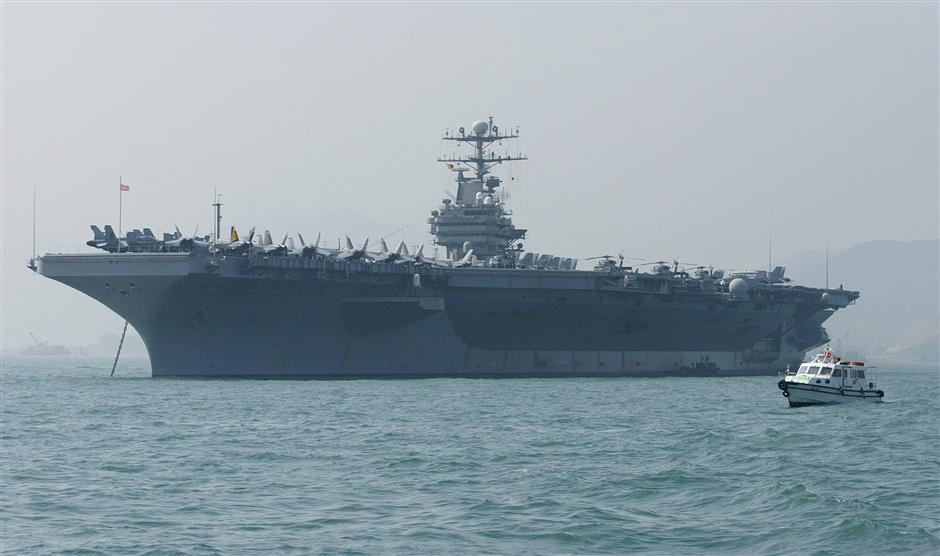US-Iran tensions rise days before first anniversary of N-deal pullout

In this file photo taken on December 23, 2004, a small boat sails by the USS Abraham Lincoln.
A sudden House announcement that a US aircraft carrier and a bomber wing would be deployed in the Persian Gulf to counter Iran comes just days ahead of the anniversary of President Donald Trump’s decision to withdraw America from Tehran’s nuclear deal.
Iranian President Hassan Rouhani is said to be planning a speech today on the anniversary to discuss the next steps Tehran will take in confronting the US. Officials in the country previously warned that Iran might increase its uranium enrichment, potentially pulling away from a deal it has sought to salvage for months.
The military has almost always had an aircraft carrier in the Persian Gulf as part of its sprawling military presence in the strategic region, but had begun to scale back its presence as the air campaign against the Islamic State group in Iraq and Syria wound down.
Sunday night’s statement from national security adviser John Bolton said the USS Abraham Lincoln, other ships in the carrier’s strike group and a bomber wing would deploy to the Mideast. Bolton blamed “a number of troubling and escalatory indications and warnings,” without elaborating.
“The United States is not seeking war with the Iranian regime, but we are fully prepared to respond to any attack, whether by proxy, the Islamic Revolutionary Guard Corps, or regular Iranian forces,” Bolton said.
In Iran, the semi-official ISNA news agency on Monday quoted an anonymous official as saying that Rouhani planned a broadcast address today and may discuss the “counteractions” Tehran will take over America’s withdrawal from the nuclear deal.
It said Iranian officials have informed their European counterparts — with whom Iran has been trying to salvage the agreement — of the planned speech.
“Partial and total reduction of some of Iran’s commitments and resumption of some nuclear activities which were ceased following (the deal) are the first step,” ISNA said. Iranian state television and the semi-official Fars news agency similarly suggested an Iranian response loomed.
A spokesman for Iran’s Supreme National Security Council, Keivan Khosravi, also dismissed Bolton’s comments as “psychological warfare.”
The United Nations’ nuclear watchdog says Iran has continued to comply with the terms of the 2015 nuclear deal, which saw it limit its enrichment of uranium in exchange for the lifting of economic sanctions.
But American sanctions have wreaked havoc on Iran’s already-anemic economy, while promised help from European partners in the deal haven’t alleviated the pain.
The US last week stopped issuing waivers for countries importing Iranian crude oil, a crucial source of cash for Iran’s government. It’s unclear what specific threat American officials perceive coming from Iran. A US official said American troops at land and sea could be targeted.
The USS Abraham Lincoln had been in the Mediterranean Sea conducting operations alongside the USS John C. Stennis, another aircraft carrier that has twice been in the Persian Gulf in recent months.
However, American military officials have stopped the near-continuous presence of aircraft carriers in the Persian Gulf, a pattern set following the 1991 Gulf War. American air bases spanning the region can scramble fighter jets and drones, lessening the necessity of an aircraft carrier.
Already in the Persian Gulf is a group of US Navy warships led by the USS Kearsarge, an amphibious assault ship carrying troops from the 22nd Marine Expeditionary Unit.















